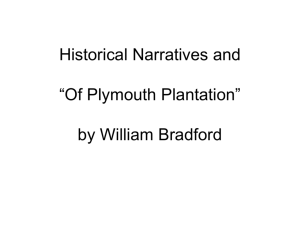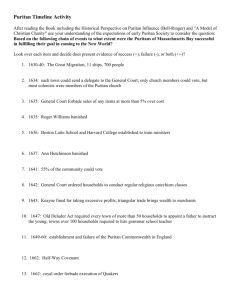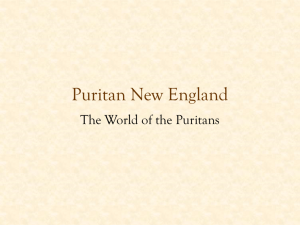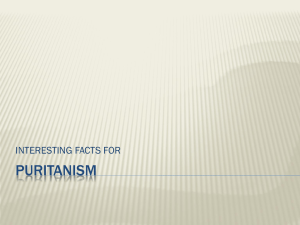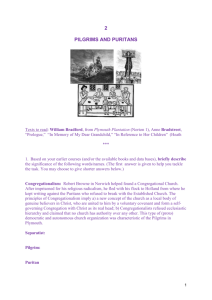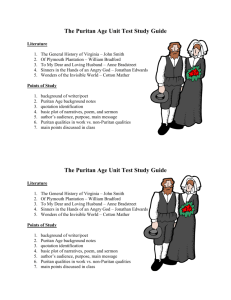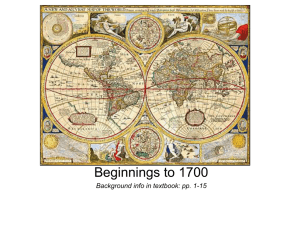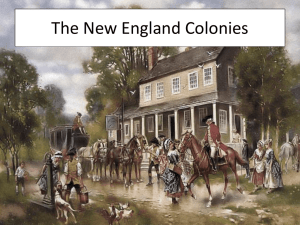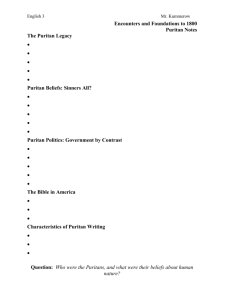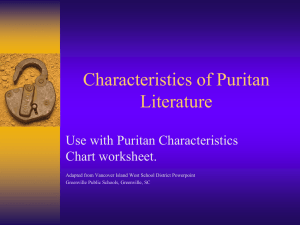Puritans - agaykhs
advertisement
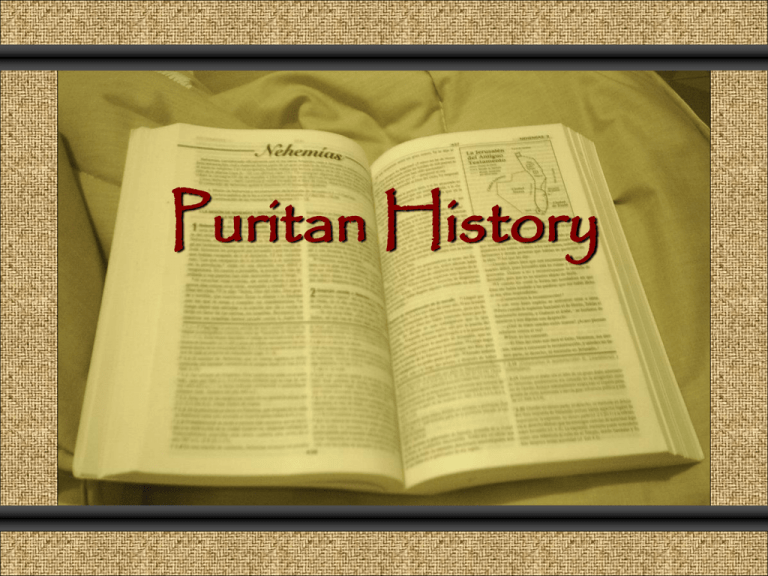
Comunicación y Gerencia Puritan History Constantine sees a vision Theocracy Government by a god or by officials claiming divine sanction This is the only form of government that nations had known from the time of Constantine, the Roman emperor who made Christianity the state religion Persecution of dissenting viewpoints was the common practice of all churches in the 15th and 16th centuries. Why were there Puritans? MARTIN LUTHER (1483-1546) •Begins the Protestant Reformation in 1517 John Calvin • Underwent a conversion experience in 1533 • Founder of Reformed Church Congregational Church Presbyterian Church • Some of his teachings form the first basis for democracy •John Calvin’s TULIP •Total Depravity •Unconditional Election •Limited Atonement •Irresistible Grace •Perseverance of the Saints Meanwhile, back in England . . . 1. Henry VIII wants a divorce from Catherine of Aragon, who cannot bear him a male heir. 2. Pope says, NO. 3. Henry VIII, being who he is, makes his own church. Thomas Cranmer becomes the first Protestant Archbishop of Canterbury A Separatist movement developed within the Puritans in Europe. They had given up on “purifying” the church deciding that only a separate movement could succeed. Plymouth Colony William Bradford,Governor of the Plymouth Colony Massachusetts Bay Colony A group of Puritans persuaded King James to grant them an area of land between the Massachusetts Bay and Charles River in North America. Lasting Effects of Puritans • Emphasis on Simplicity in Worship • Public Education • High Moral Standards • Democratic Political Principles • Puritan Ethic – Believed good was accomplished through hard work, self-reliance, and self-discipline. Influenced industrialism and efficiency. Harvard University Puritan Literature Purpose for Literature: provide spiritual insight and instruction – Mostly sermons, theological studies, and hymns Style of literature: • Puritan Style - plain writing style with a clear statement • Characterized by short words, direct statements, and references to ordinary, everyday objects (against anything ornate) • Simple, Spiritual, Straightforward Types of Puritan Literature • Some narrative accounts such as histories, biographies, and autobiographies. • Some poems, journals and diaries, but their aim was primarily for serious self-examination • Did not produce fiction nor drama because they regarded both as sinful. Anne Bradstreet (1612-1672) • Came from a well-do-family. Her father was steward for the Earl of Lincoln who was also a Puritan • Exceptionally well-educated for a woman of her day • Only 18 when she and her husband moved to Massachusetts Bay Colony • Both her husband and father served terms as Governor • Raised eight children Anne Bradstreet Wrote for herself, not publication – Published in 1650 – considered to be the first collection of original poetry written in the colonies – First female poet to be published Used Plain Puritan Style William Bradford • Elected governor after the first leader died – Reelected fifteen times • Helped create positive Indian relations and democratic town hall meetings • Began writing his narrative Of Plymouth Plantation in 1630, but it was not published until 1856 • Used “Puritan Plain Style” Of Plymouth Plantation • Narrative Account – Tell the story of real-life events. Can be first-hand or written by someone that researched the events. • Considered the most complete authority on the Puritans and a primary document on the time period. First page from Bradford’s Journal

